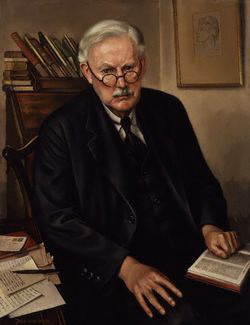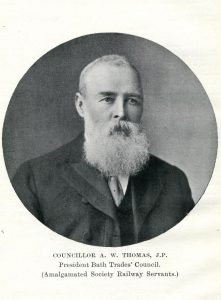
by John Mansbridge,painting,1947
Every year thousands of adults take up learning with the Workers Education Association. They run courses from learning about the internet to local history.
The Association is more than 100-years-old and was formed by Albert Mansbridge (1876-1952) who was born near the India House in Barton Street, Gloucester. His father was a carpenter and his mother an active member of the Women’s Co-operative Guild.
Albert wanted “workers to have their share of the kingdom of the mind,” according to biographer Mary Stocks. He was working as a clerk for the Co-op when he sought to win trade union support for his mission to bring education to working people. Albert became a teacher and in 1903 established the Association for Promotion of Higher Education for Working Men, later to be re-named the WEA. He wrote a book called An Adventure in Working Class Education in which he said: “Every living person is potentially a student.” Albert helped found the South West Co-operative Housing Association and was chair between 1944-48 when it set out to provide homes after the war. A road on the Society’s estate in Totnes, Devon is named after him.
He died in Torquay in 1952 and is buried in Gloucester Cathedral.
Swindon education
In 1843 fifteen workers from the Great Western Railway set up a modest library with 150 books. The next year, with the support of the company, a Mechanics’ Institute was established with the object of ‘disseminating useful knowledge and encouraging rational amusement’. The Institute, in the centre of Swindon’s GWR Railway Village, became one of the largest of its kind. It is a monument to workings’ mutual improvement and co-operation.
Reuben George was a strong supporter of adult education in Swindon. George came to Swindon from Gloucester as a young man and worked there as agent for the Wesleyan and General Insurance Company. He supported the WEA and ran university extension lectures. George was also a key figure in the formation of the Swindon Labour Party in 1916 and he was one of the first three Labour candidates to stand for Parliamentary election in Wiltshire. He was a Swindon Town Councillor and mayor in 1921-2.
Whiskey Money
 Trade unions pressed for vocational or technical education, especially for young workers and apprentices. The Technical Instruction Act of Parliament was passed in 1889 and a scheme was introduced called ‘Whiskey Money’. Local authorities could raise additional funds for technical education. In 1891 trade unionists formed Bath Trades Council to campaign to establish a technical college in the city. John Turner proposed a motion to devote a portion of the local tax and in 1892 technical training started in a large town house in Green Park, a short distance from the city centre. In 1896 the Bath Municipal Technical College opened in a newly built north wing of the Guildhall offering evening classes in various sciences. Councillor AW Thomas, President of the Trades Council became a member of the Technical Education Committee. He was the first working class JP in the county.
Trade unions pressed for vocational or technical education, especially for young workers and apprentices. The Technical Instruction Act of Parliament was passed in 1889 and a scheme was introduced called ‘Whiskey Money’. Local authorities could raise additional funds for technical education. In 1891 trade unionists formed Bath Trades Council to campaign to establish a technical college in the city. John Turner proposed a motion to devote a portion of the local tax and in 1892 technical training started in a large town house in Green Park, a short distance from the city centre. In 1896 the Bath Municipal Technical College opened in a newly built north wing of the Guildhall offering evening classes in various sciences. Councillor AW Thomas, President of the Trades Council became a member of the Technical Education Committee. He was the first working class JP in the county.
Bristol Socialist schools
In Bristol there were attempts to establish a Socialist Sunday School in rooms rented to the Bristol Socialist Society facing the Horsefair, and known as ‘The Socialist Centre’. These paved the way for the Independent Labour Party’s successful schools at the Kingsley Hall, and the Socialist Guild of Youth Movement.
Unionlearn
Read more about what unions do today to support learning at work: unionlearn.